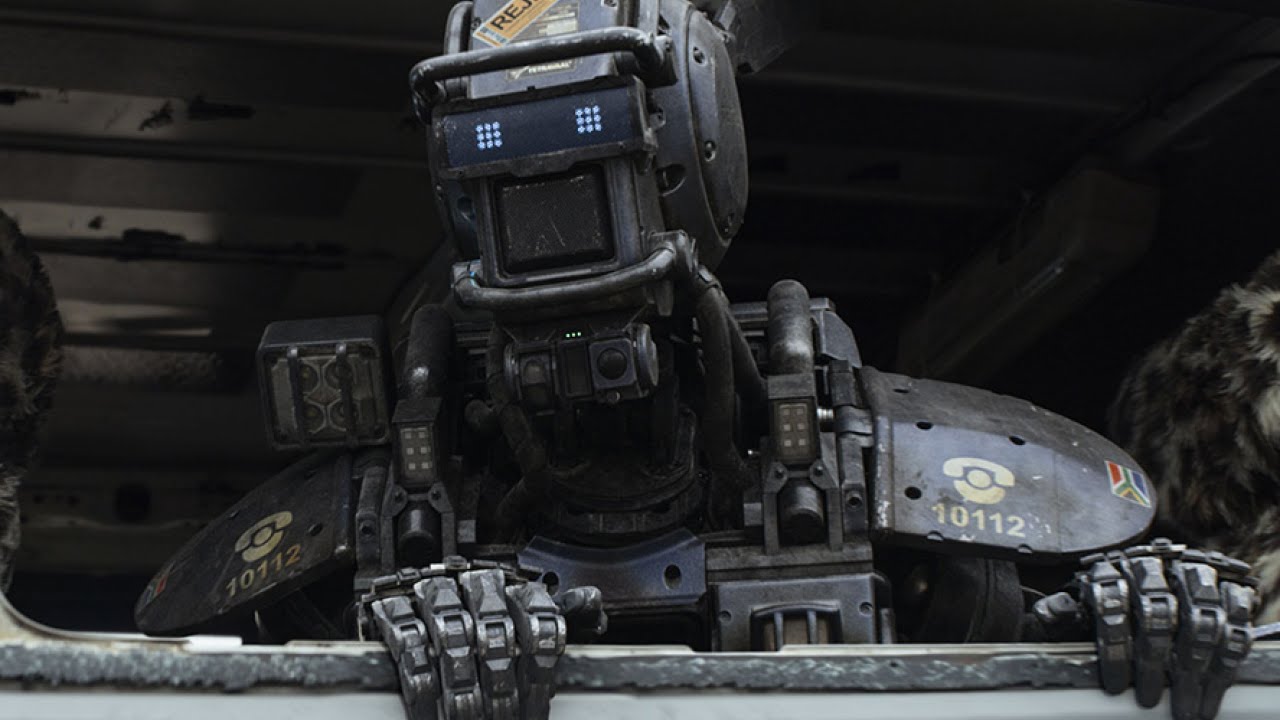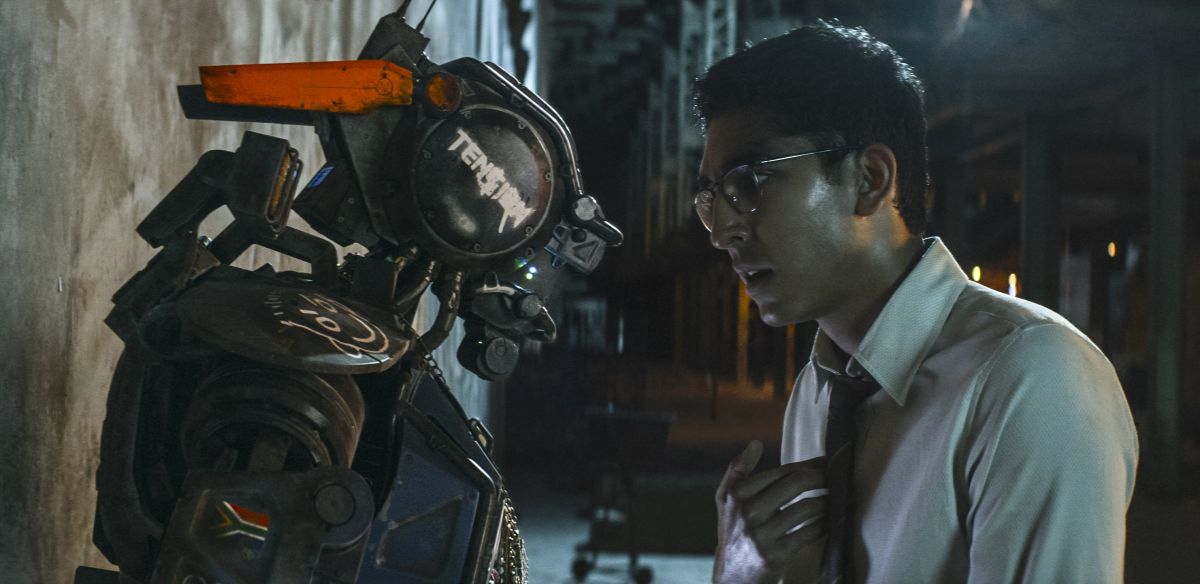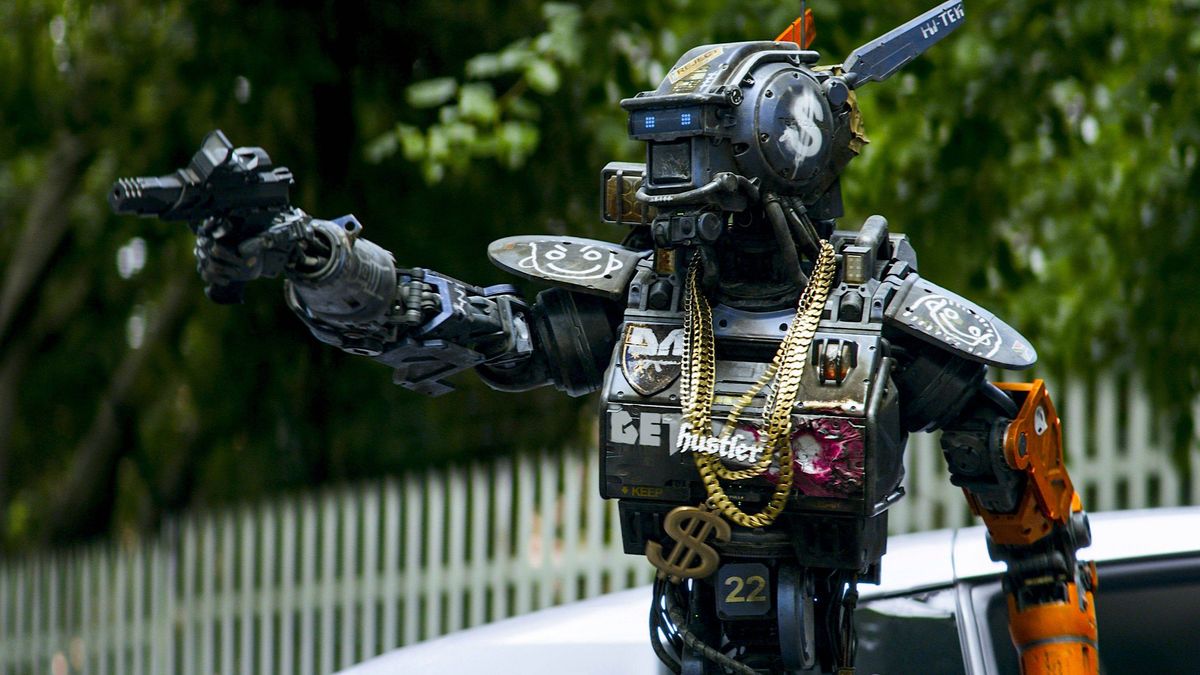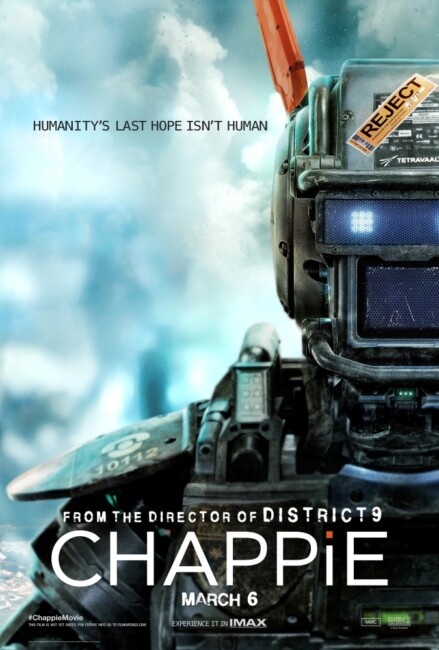USA. 2015.
Crew
Director – Neill Blomkamp, Screenplay – Neill Blomkamp & Terri Tatchell, Producer – Simon Kinberg, Photography – Trent Opaloch, Music – Hans Zimmer, Visual Effects Supervisor – Chris Harvey, Visual Effects – The Creative Cartel Inc., The Embassy & Image Engine, Special Effects Supervisor – Max Poolman, Props/Weapons/Makeup Effects – Weta Workshop (Supervisor – Richard Taylor), Production Design – Jules Cook. Production Company – Kinberg/Genre.
Cast
Sharlto Copley (Chappie), Dev Patel (Deon Wilson), Hugh Jackman (Vincent Moore), Ninja (Himself), Yo-Landi Visser (Yolandi), Sigourney Weaver (Michelle Bradley), Brandon Auret (Hippo), Jose Pablo Cantillo (Yankie/Amerika), Anderson Cooper (Himself), Maurice Carpede (Police Chief)
Plot
Johannesburg in the near future where policing has been taken over by robots designed by the Tetravaal Corporation. When an armed heist conducted by Ninja and his girlfriend Yolandi is foiled by the robots, the crime boss Hippo demands they pay back the twenty million. Realising that the robots are thwarting them, Yolandi wonders if there is not a remote control that will turn them off. Meanwhile, the robots’ designer Deon Wilson believes he has successfully created an artificial intelligence. When he is refused the use of a robot to test his A.I. by Tetravaal CEO Michelle Brady, he appropriates a robot that has been damaged in the heist. He returns home, only to be abducted by Ninja and Yolandi, seeking the off-switch. During this, he activates the damaged robot using his A.I. chip. The robot comes to life and is like a scared child but quickly begins to absorb information and learn. They nickname it Chappie. Ninja is only interested in training Chappie to wield weapons to aid them but Deon forbids it from engaging in crime. As Ninja tries to work ways around this, Deon’s co-worker Vincent Moore, who wants to replace the robots with his heavily armed Moose machines, discovers what is going on. Determined to sabotage the police robots so that the Moose can step in, Vincent deletes all their control files, causing complete anarchy in the city as all the police robots stop dead.
Neill Blomkamp was born in South Africa but emigrated to Canada in the late 1990s where he won his stripes working at some of the Vancouver visual effects studios. He made four short films during the early 2000s, which became the springboard whereby he launched his directorial career. On the basis of these, he was selected by Peter Jackson to helm the proposed big-budget version of the Halo videogame but this failed to come off. Their efforts segued into Blomkamp’s feature-length directorial debut with District 9 (2009), a strong and effective mix of biting social satire and effects craftsmanship. The film gained far higher word of mouth and appreciation than one initially thought it would, even having been called one of the top science-fiction films of the 2000s. Blomkamp’s name rose to considerable prominence as a result. He followed District 9 up with Elysium (2013), another mix of biting social satire and action and effects vehicle, although one that surprisingly failed to hit box-office expectations and received very mixed reviews.
With Chappie, Neill Blomkamp is making a feature-length film spun out from one of his earlier shorts films Tetra Vaal (2004). What Blomkamp is setting out to do seems highly ambitious. He is using performance capture animation to bring the title character to life, which offers the fascinating ideas of the incorporation of machine and human-like movements.
Stories about the awakening of artificial intelligence and/or the coming to life of robots and androids are rich in possibility. There have been too many bad handlings – think of Demon Seed (1977), Galaxina (1980), Electric Dreams (1984), Short Circuit (1986), Bicentennial Man (1999), I, Robot (2004), Delete (2013), Transcendence (2014), Morgan (2016), Zoe (2018), Outside the Wire (2021) and numerous B-budget android action films of the 1990s – and not that many good ones to choose from – The Questor Tapes (1974), several of the Data episodes of Star Trek: The Next Generation (1987-94), A.I. (Artificial Intelligence) (2001), the recent likes of Her (2013), The Machine (2013), Automata (2014) and tv’s Westworld (2016-22). It seems a thematic field rich in untapped possibilities. Certainly, this was something that Ex Machina (2015), debuting only a month after this, managed to do to perfection. (For a more detailed overview of the genre see Films About Artificial Intelligence).
I am really not sure at what point Chappie started to go wrong. Part of it I think rests in the approach of Neill Blomkamp. I fall short of someone calling him the Great White Hope of Science-Fiction cinema. As I have stated before, his work seems to fall somewhere between James Cameron and Michael Bay. Blomkamp has Cameron’s great humanist visions and fascination with credibly detailed technology – if Cameron were to retire, I am sure Blomkamp would be first at the door to take up his throne.

On the other hand, both District 9 and Elysium suffer from having well set up initial scenarios, strong and interesting ideas but lose it when it comes to their third act. Blomkamp seems to either hurry through his ideas, to be trying to cram too many things together (as here) or reaches a third act with no idea where to take the story before the point he invariably goes for the Michael Bay and starts blowing everything up. Blomkamp publicly apologised for Elysium not having come off in the script department; I am not sure then what his excuse will be for repeating the same mistake with Chappie.
Chappie starts out with the interesting idea of conducting a variant on Short Circuit – the childlike robot awakening to consciousness – and tossing it into the hyper-militarised near-fascistic police state of RoboCop (1987). This is a potentially interesting idea but one that suffers from Blomkamp having too much happening in the film. Did the film, as well as being a work about the birth of a sentient machine, also need to be a big shoot-’em-up film about petty hoods, as well as a work about corporate rivalry? (Not to mention that the casting is contorted in order to have to fit in appearances from Ninja and Yo-Landi Visser, who collectively form the South African rap group Die Antwoord). It results in elements often being twisted out of shape or credibility to serve plotting ends.
The notion of Mind Upload, for instance, which would be an extraordinary technical discovery, is introduced in about two minutes of screen time and then becomes a major last minute element that miraculously saves the day (seemingly involving magical technology that allows the scanning of what would be untold petabytes of data that constitute a human mind and its transference into a robot body within the couple of minutes or so it takes security forces to cut through a door. Oh and did I also mention that this is the first time such a process is being tested out and is miraculously bug free?).
Elsewhere we have improbable design elements in the robots – no off switches, permanently on batteries – that exist solely for plotting convenience. If for a moment there had been any common-sense design, much of the plot would have been over in five minutes. You cannot also help but think as the robots skip off into the sunset together at the climax that this would be a happy ending that lasted about as long as it took Tetravaal to find and deactivate them using the tracking chips that all the other robots have built in.

The idea of a robot coming to life is a fascinating one. We have some great scenes where Chappie starts learning, even doing things like beginning to paint. However, Blomkamp also has action elements going on and very quickly, the story about Chappie coming to sentience is co-opted by comically ridiculous scenes with the hoodlums turning him into a gangster, teaching him how to use weapons and conducting car-jackings. These get a laugh from the audience but really as a serious A.I. story, it is down around the level of the comic inanity of Short Circuit 2 (1988). Mind you, the credibility started leaking out of the film about the time that Blomkamp thought it was a good idea to have Dev Patel using a rubber chicken as a teaching tool.
Much of the film feels as though Neill Blomkamp simply hasn’t sat down and thought things through. People do things for stupid reasons. You have what may well be some of the stupidest criminals in existence – whose improbable plan to obtain 20 million (presumably rands) involves taking a robot that has just become sentient and has the mind of a child and training it to become a gangster within seven days and then using it to jack a large number of cars to buy the explosives they need to then conduct an armoured car heist. And then when they have this sentient robot partially in their control, what do they do but take it into the middle of nowhere and abandon it to be beaten to scrap metal by a group of petty thugs?
And then we come to Tetravaal, which may well be one of the most incompetent corporations on record. There is one all-important activation key for the robots and no back-ups, which Dev Patel seems free to steal without any security procedures in place to stop him. And then there is Hugh Jackman’s character who seems to have the freedom to openly carry a sidearm in an office environment. (I am not sure if this is standard behaviour for Johannesburg, which given some of the things regarding South African gun culture that came out during the Oscar Pistorious trial might be something that is regarded as the norm). Moreover, he is able to pull his weapon on Dev Patel and threaten him in full view of his co-workers without attracting any disciplinary action. (In the US, you would imagine that something like that would end up with SWAT teams cordoning the building off within five minutes and Jackman arrested, if not outrightly shot by a trigger-happy cop).
Later, in order to advance his own designs, Hugh Jackman sabotages the robots by accessing the central network and sending a command to delete each robot’s control file. Again this goes back to people in the film behaving in stupid ways for the convenience of the plot – is Jackman so utterly oblivious to consequences that he does not realise that this would also reduce an entire city to anarchy? Is Tetravaaal so incompetent that they have no backups or system restore procedures in place for the robots? Or that they don’t have password and log-in procedures that would allow them to work out who had accessed the system and deleted the files? Either that or is Hugh Jackman such a bungling systems designer that he does not realise that each of his logins would be recorded and time stamped?

Weta Workshop and the various visual effects houses do an amazing job bringing Chappie to life. It is almost a case of the character being far superior to the film that surrounds it. Neill Blomkamp gives us some great scenes with an abandoned Chappie patting dogs, learning to paint, sitting in bed having children’s stories read by Yo-landi and so forth. These scenes also vies with the moronic – those of Chappie carjacking and the climactic scenes with it throwing Hugh Jackman around while telling him off in a petulant South African accent “You’re a verry bed men.”
The great disappointment of the film is that Neill Blomkamp seems more interested in cartoonish action scenes than he is in exploring the underlying issues and ideas of the film. He again films in South Africa but where District 9 held a bitingly potent examination of racial and social tensions in the country, and where Elysium similarly took on social inequality, Chappie seems devoid of any social message-making. Personally, I would be disturbed living in a society that has such a heavily militarised police force (and moreover, one readily willing to engage in massive armed combat within urban areas) – I mean, imagine recent incidents of police overkill like Michael Brown in Ferguson or Eric Garner and the NYPD, which notedly occurred only with regular armed police, and imagine that amplified by giving the police the capacity to raze an entire city block. RoboCop dealt with these issues in a satiric way – indeed, Blomkamp seems to be homaging RoboCop in having Hugh Jackman’s design for The Moose closely resemble the Ed209’s – but such a social future remains strangely in a void.
The other point of irritation is how the film skates over the issues of Artificial Intelligence. Blomkamp seems to assume that a newly awakened robot would be no different to a child or an animal. This is often reflected in Sharlto Copley’s motion-capture performance. But is that really the way a sentient machine would behave? Would it have natural fear instincts that would make it cower from threat or reach up to shade its face with its hands? Chappie seems highly imitative of human behaviour and I have no problem with this but would this mean that it would develop a moral sense by the end of the film – would the preservation of human life be anything more than programming priorities to it? Would it be able to abstract from this to be able to get angry at people it perceives as having stolen ‘daddy’s cars’? In that the friendships and family connections we make in the real world come from our brains triggering tiny feelgood chemicals every time we see someone we care about, would a machine that lacks such chemical responses be able to form similar reactions and feel things towards people it regards as its creator, or ‘mommy’ and ‘daddy’? These are fascinating issues that a screenplay that dug deeper into its issues might have dealt with. Instead, all that we get a pimped-out, car-jacking version of Short Circuit‘s No. 5.
Chappie was not a box-office success. Neill Blomkamp next spent through several years touting the idea of an Alien sequel that never came about before making the possession/Virtual Reality film Demonic (2021) and the videogame adaptation Gran Turismo (2023). He has also produced Ash (2025).
Trailer here


